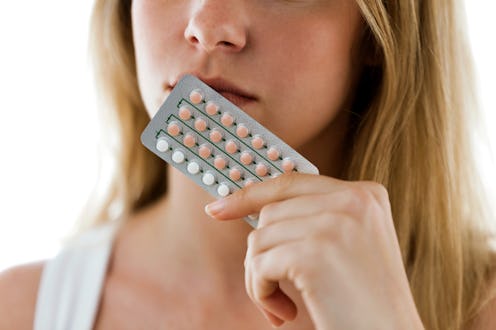Life
Starting The Pill As A Teen Was Linked To Depression In A New Study

The oral contraceptive pill has been a gift to millions of people worldwide, helping them take control of their pregnancy and manage the symptoms of other conditions. According to statistics, many people start taking the pill in their teen years; a study in 2011 found that 18% of American girls between the ages of 13 and 18 were on oral contraceptives. Now, a new study published in the Journal of Child Psychology and Psychiatry has investigated a potential link between beginning oral contraceptive use in your teen years and a higher risk of depression — but, the researchers behind the study tell Bustle, that doesn't mean everyone who took oral contraceptives in their teens will develop depression. And in fact, a lot more research needs to be done.
The study, which was conducted by academics from the University of British Columbia, used data from the United States National Health and Nutrition Examination Survey, a survey of health across America. The researchers were looking for signs of a link between teenage oral contraceptive use and depression, and found some interesting results. Dr. Christine Anderl, a postdoctoral researcher and lead author of the study, tells Bustle, "We analyzed data on more than 1,200 women and found that teenage birth control pill users were 1.7 to 3 times more likely to be clinically depressed in adulthood than women who had not used birth control pills during their teenage years."
Importantly, the study didn't look at why this link might exist. It's not clear what, if anything, might change in teens who take oral contraceptives to make them more vulnerable to depression in later life. "Our results suggest that adolescence may be a sensitive period during which birth control pill use could increase women’s likelihood to develop depression until years after first taking them," Dr. Anderl says. However, it's only a hypothesis; there could be other mechanisms at work.
If you're now concerned about whether your teenage oral contraceptive use might have affected your mental health, the researchers tell Bustle that the study doesn't mean the pill definitely causes depression — just that a link seems to exist. "Our study was correlational," Dr. Frances Chen, PhD, associate professor and senior author of the study, tells Bustle. "Although we statistically controlled for all variables in the dataset that we felt might provide a plausible alternative explanation for the relationship between teenage birth control pill use and depression in adulthood (including age at first period, and age at first sexual intercourse), it would be premature to conclude that birth control pill use during the teenage years causes increased depression risk in adulthood."
In other words, while the data might look definitive, a lot more work needs to be done to establish whether there's a real link or it's just a coincidence — and what mechanisms may be at play. "More research is needed to determine which women are more sensitive to the side effects of the pill than others, and why," Chen says. "There are clear benefits to using the pill, and many women do not experience adverse side effects."
The study also only looked at oral contraceptives and not other kinds of hormonal birth control, and relied on subjects remembering their age when they first took the pill — which could be inaccurate. So the relationship between taking the pill as a teen and later depression isn't hard and fast. Luckily, we live in a world where there are a lot of different kinds of contraception, from the pill to hormonal implants and patches to non-hormonal IUDs.
"We do encourage teens and their parents to talk to their doctors if they are experiencing side effects from OC, and to discuss the risks and benefits associated with different contraceptive options," Chen says. Further research might identify what could link teen contraceptive use and depression — or it might identify something else that explains why they look related.